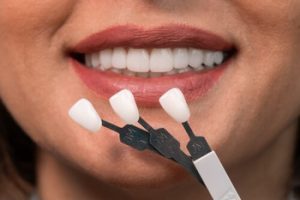Veneers vs Dentures: Which Is the Right Fit for Your Smile?

When it comes to enhancing or restoring our smiles, modern dentistry offers a plethora of options. Among the most popular are veneers and dentures. Both serve unique purposes and cater to different dental needs. While veneers primarily focus on cosmetic improvements, dentures, especially complete dentures, come into play to replace missing teeth. So what should you choose: veneers vs dentures? Let’s embark on a detailed journey, understanding the core differences between these two and focusing on the advantages of opting for dentures over veneers.
What Are Dental Veneers?
Dental veneers, often seen as a flagship treatment in cosmetic dental procedures, are ultra-thin shells meticulously designed to adhere to the front surface of a tooth. These shells are fabricated from two primary materials: porcelain or composite resin.
Their principal application lies in transforming the visual aesthetics of teeth that may have imperfections. For individuals plagued by chipped teeth, unsightly gaps, or stubborn tooth discolouration that professional whitening can’t remedy, veneers emerge as a beacon of hope.
Types of Veneers:
 Porcelain Veneers: These veneers are renowned for their robustness and durability. Crafted from high-quality porcelain, they mimic the translucent nature of natural tooth enamel, ensuring that the veneers blend seamlessly with the surrounding teeth. They are resistant to staining and can substantially revamp a person’s smile.
Porcelain Veneers: These veneers are renowned for their robustness and durability. Crafted from high-quality porcelain, they mimic the translucent nature of natural tooth enamel, ensuring that the veneers blend seamlessly with the surrounding teeth. They are resistant to staining and can substantially revamp a person’s smile.- Composite Veneers: Crafted from a composite resin material, these veneers can either be direct or indirect. Direct composite veneers are applied layer by layer directly onto the tooth in the dentist’s office and then sculpted to the desired shape. Indirect veneers, on the other hand, are first made in a dental lab and then bonded to the teeth. They tend to be more wear-resistant than their direct counterparts.
- Temporary Veneers: Before the placement of the permanent veneers, temporary ones are often set as a provisional measure. These veneers give patients an idea of the final result and protect the teeth while the permanent veneers are being crafted.
What Are Dentures?
Dentures have long been a trusted solution for individuals grappling with missing teeth. Whether the tooth loss is due to gum disease, tooth decay, or other dental issues, dentures provide both functional and aesthetic relief.
Crafted meticulously from materials like acrylic, nylon, or even metal, they serve to replace missing teeth, allowing users to eat, speak, and smile with newfound confidence. Apart from serving as replacement teeth, they play a pivotal role in upholding the facial structure, warding off the sagging appearance that can arise from missing multiple teeth.
Types of Dentures:
Complete Dentures
For individuals who have lost all their teeth, full dentures emerge as the solution. Two main types are prevalent:
Conventional Dentures: Crafted after the teeth removal and once the gum tissue starts healing, these are placed after a few months of tooth extraction.
Immediate Dentures: These are pre-made and can be positioned soon after the teeth are removed, ensuring the individual isn’t without teeth during the healing period.
Partial Dentures
Filling the gap left by sections of missing teeth, partial dentures are anchored to the remaining teeth using precision attachments. The false teeth offer a blend of aesthetic appeal and functionality and are often seen as a middle-ground solution, striking a balance between dental bridges and dental implants.
Implant-Supported Dentures
As a contemporary solution for missing teeth, these dentures are firmly anchored using dental implants drilled into the jaw bone. This gives them unparalleled stability and comfort, eliminating the common problems associated with traditional dentures, like slipping or movement.
Veneers vs Dentures: Deep Diving into the Comparison
Purpose
At their core, veneers are the epitome of cosmetic enhancement. They cater to those with teeth that are fundamentally healthy but might have cosmetic imperfections like crooked teeth or staining. Dentures, however, are the torchbearers of functionality. They step into the limelight when there’s a need to replace missing teeth and restore lost oral functions.
Longevity
 Porcelain veneers, with their robust material, can grace a person’s smile for a decade or even longer with proper care. Composite veneers, though more affordable, tend to have a slightly reduced lifespan, necessitating replacements every 5 to 7 years.
Porcelain veneers, with their robust material, can grace a person’s smile for a decade or even longer with proper care. Composite veneers, though more affordable, tend to have a slightly reduced lifespan, necessitating replacements every 5 to 7 years.
Dentures, especially partial ones, come with their own set of longevity metrics. While they might last anywhere from 5 to 8 years, ensuring regular dental check-ups is pivotal for maintaining their optimal fit and appearance.
Oral Health Impact
While transformative, veneers require a minute portion of the natural tooth enamel to be removed to ensure a snug fit. This process is irreversible. In contrast, dentures demand no such enamel removal unless necessitated by a prior tooth extraction or other underlying dental issues.
Aesthetics vs Functionality
While both veneers and dentures significantly uplift one’s appearance, their primary objectives diverge. Veneers are all about refining and perfecting an existing smile. Dentures, conversely, reinstate the lost functionality stemming from missing teeth, ensuring the individual can chew and speak without hindrance.
Unearthing the Advantages of Dentures Over Veneers
- Versatility: Dentures, especially the partial variant, are chameleons in the dental world. Whether you’re missing a single tooth, multiple ones, or even the entirety of your teeth, dentures can be tailored to fit the bill. This makes them a go-to solution for diverse scenarios, ranging from advanced gum disease to extensive tooth decay.
- Cost: While Australia’s dental industry offers many solutions, cost can be a determining factor for many. While veneers, especially the porcelain kind, might command a heftier starting price, dentures, particularly partial ones, frequently emerge as a cost-effective alternative, especially when addressing extensive dental concerns.
- Non-Invasive Nature: The veneer application requires minimal enamel removal, making it an irreversible procedure. Dentures, in contrast, are largely non-invasive. Even if teeth extractions are on the horizon, it’s the underlying dental concerns, and not the dentures per se, that dictate this need.
- Facial Structure Preservation: Tooth loss can, over time, lead to a receding jawline and sagging facial muscles. Dentures, especially the complete variety, act as a bulwark against this, lending support to the cheeks and lips and maintaining the natural facial contours.
- Speech and Mastication: With missing teeth, everyday tasks like speaking or chewing can become herculean challenges. Dentures, especially the complete variant, restore this lost functionality, ensuring clarity of speech and unhindered mastication.
- Adaptable Solutions: Dental advancements have ushered in innovative denture solutions. Options like snap-in dentures and the implant-supported variety offer enhanced stability and a snugger fit, vastly improving the user’s comfort.
- Natural Aesthetic Appeal: Modern-day dentures have undergone significant evolution. Far from their clunky predecessors, today’s dentures are crafted with an eye for detail, mirroring the appearance of real teeth. This ensures that wearers not only regain lost functionality but also sport a natural-looking smile, augmenting their self-confidence.
Understanding the Process Behind Veneers and Dentures
The process behind acquiring veneers and dentures is intricate and tailored to the patient’s individual needs. Let’s delve deeper into the meticulous procedures that set the stage for these transformative dental solutions.
The Journey to Dental Veneers
- Consultation: The journey towards veneers begins with a consultation. Here, the dentist will evaluate the patient’s oral health, ensuring that veneers are the most suitable solution for their dental issues.
- Tooth Preparation: Once it’s decided that veneers are the appropriate route, the teeth are prepared. This entails minimal removal of the natural tooth enamel, creating space for the veneer. After the tooth has been prepared, an impression of it is taken.
- Creation: Based on the impression, the veneers are custom-crafted in a dental lab. The focus is on ensuring a fit that’s both comfortable and aesthetically in line with the patient’s existing teeth.
- Bonding: Once the veneers are ready, they are carefully bonded to the prepared teeth. A special adhesive and light source ensure that the veneers are securely attached.
- Final Adjustments: Post-placement, the dentist might make slight adjustments to ensure optimal fit and comfort, ensuring the veneers integrate seamlessly with the patient’s natural teeth.
The Road to Dentures
 Initial Assessment: The first step towards acquiring dentures is an initial consultation. Here, the dentist evaluates the patient’s oral health, focusing on the extent of teeth missing and how healthy the remaining teeth and gums are.
Initial Assessment: The first step towards acquiring dentures is an initial consultation. Here, the dentist evaluates the patient’s oral health, focusing on the extent of teeth missing and how healthy the remaining teeth and gums are.- Moulding and Impressions: Accurate impressions of the patient’s mouth are paramount. These serve as the blueprint for crafting dentures that align perfectly with the patient’s oral structure.
- Denture Fabrication: Using the impressions, the dentures are meticulously crafted in a dental laboratory. The aim is to mirror the look of natural teeth as closely as possible while ensuring functionality.
- Fitting and Adjustments: Once the dentures are ready, the patient returns for a fitting. The dentist might make minute adjustments to ensure the dentures fit snugly and comfortably.
- Follow-ups: Patients need to have periodic check-ups post denture placement. This ensures that the dentures remain in optimal condition and that any minor dental problems or discomforts are promptly addressed.
Potential Challenges and Maintenance Tips
Both veneers and dentures, while transformative, do come with their set of challenges. However, with proper care, these challenges can be navigated smoothly.
Veneers:
Challenges: Potential issues can include sensitivity post-procedure, especially to hot or cold foods and drinks. Additionally, while robust, veneers aren’t impervious. They can crack if subjected to undue pressure, like using teeth as tools or chewing on hard items.
Maintenance Tips: Regular brushing and flossing are essential. Using a non-abrasive toothpaste ensures the veneers retain their lustre. Regular dental check-ups allow for early identification and rectification of any issues.
Dentures:
Challenges: New denture wearers might experience minor irritation or soreness. There’s also a learning curve involved in eating and speaking with dentures. Over time, dentures might require relining due to natural changes in the gums and jaw bone.
Maintenance Tips: Daily cleaning of the dentures using special brushes and solutions is crucial. It’s pivotal to avoid using boiling water or abrasive cleaning materials. At night, dentures should be placed in water or a denture-cleaning solution to maintain their shape. Regular dentist visits ensure the dentures remain well-fitted and in top-notch condition.
Cost Implications in Australia
Dental treatments can be a significant investment, and understanding the cost implications is crucial. In Australia, the starting price for veneers can vary based on the material and complexity. Porcelain veneers are normally more costly than composite ones.
Permanent dentures, on the other hand, can vary in price depending on whether they’re complete or partial, traditional or implant-supported. Partial dentures, due to their smaller size and less intricate design, usually come with a more affordable starting price than complete dentures. However, implant-supported dentures, with their enhanced stability and comfort, might command a higher price due to the implants’ incorporation.
It’s always advisable to have a comprehensive consultation with a dentist who can provide detailed cost estimates tailored to individual needs.
In Conclusion
In the realm of cosmetic and restorative dentistry, both dentures and veneers have carved out their significant niches. Veneers are excellent for minor dental and cosmetic problems, while dentures are the go-to solution for significant tooth loss scenarios. Considering factors like cost, purpose, longevity, and the impact on overall oral health can guide you in making an informed decision.
However, it’s always recommended to consult a dentist to understand the best treatment options for your unique situation. Your oral health, existing dental issues, and aesthetic desires are vital in determining the right fit for you.
Are you seeking more insights on veneers vs. dentures or other dental procedures? Don’t hesitate. Dial My Local Dentists at (02) 9000 1239 for expert guidance.
References:
https://www.authoritydental.org/dentures-vs-veneers
thedentalguide.net/veneers-vs-dentures/
